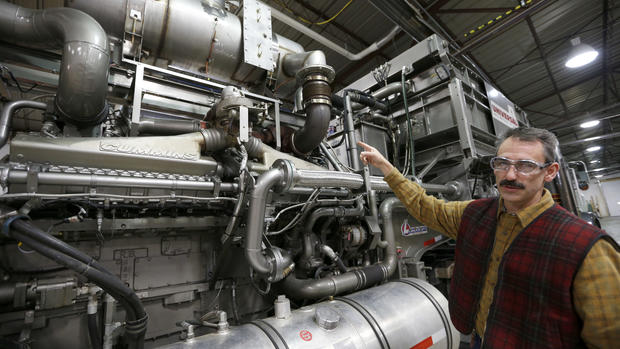Davos: Countries study U.S. energy boom
(Moneywatch) Soaring domestic oil and gas production is helping the U.S. economy by lowering energy costs and cutting carbon emissions back to 1992 levels. The question, government officials and corporate executives asked today at a session at the World Economic Forum in Davos, is whether the new extraction technologies behind the North American energy boom can be replicated elsewhere.
Participants in the session included Robert Hormats, U.S. Undersecretary of State for Economic, Energy and Agricultural Affairs; Fatih Birol, chief economist of the International Energy Agency; Majid Jafar, managing director of the board with United Arab Emirates firm Dana Gas; and Tulsi Tanti, chairman of Indian energy company Suzlon.
The U.S. and Canada are the first nations to have capitalized on new ways of getting oil and gas from shale and other dense rocks. The emergence of such methods is transforming the global energy picture. Notably, the combined oil production of the two nations now exceeds the maximum sustainable output of Saudi Arabia, with economic forecaster Yardeni Research predicting that trend to accelerate in the years to come.
Partly as a result of these energy extraction technologies, along with the severe recession that followed the 2008 housing crash, oil imports have dropped from 60 percent in 2005 to 42 percent today. America is already a large exporter of oil and will be a net exporter of natural gas by 2017, according British energy firm Centrica.
- U.S. recovery fueled by record low natural gas prices
- "Fracking": Is it a dirty word?
- Big bankers defend against critics amid crisis
That growing productive capacity and dwindling reliance on overseas oil sources is expected to significantly boost the U.S. economy. "Exports of petroleum products, petrochemicals, coal and fertilizers will continue to increase," economic research firm IHS Global Insight said in a recent report. "These trends will dramatically reduce the U.S. trade and current-account deficits (already down from a few years ago)."
Low natural gas prices is making U.S. industry more globally competitive, experts say. In addition to helping domestic steel, aluminum and glass producers cut costs, falling energy prices is encouraging foreign companies to operate in the U.S.
"This 'competitive stimulus' has already attracted European, Latin American and Asian energy-intensive investment and encouraged U.S. producers to 'onshore,' " according to IHS. "For the first time in many decades, a number of large global chemicals companies have announced plans to build or expand facilities in North America for exports."
That will bring capital expenditures totaling around $95 billion over the next decade, focused primarily on ethylene production, the research firm wrote.
Lower natural gas prices are also spurring many U.S. electrical plants and homeowners to switch from coal or oil. This has resulted in a 9 percent drop in U.S. carbon emissions. It has also created an environmental conundrum. The method used to extract oil and gas from shale -- known as hydraulic fracturing, or "fracking" -- is drawing increased scrutiny from environmentalists and people living near the extraction sites who are concerned about oil, gas and chemicals seeping into drinking water.
Even without those concerns, the extraction methods that have lifted energy production in the U.S. and Canada may be less effective in other countries. A number of factors contributed to fracking taking off in North America. These include a sophisticated energy infrastructure, private ownership of mineral rights, competitive drilling industry, access to investment, and supportive government policies and regulation, according to IHS.
